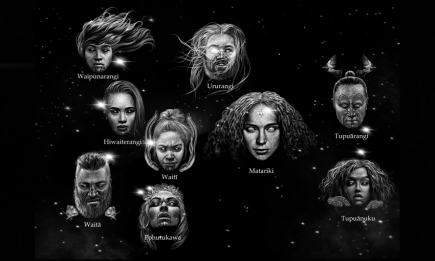In God's Time
Happy Matariki e te whānau! As the Matariki constellation (also known as Pleiades) rises above into the winter skies, the welcoming of the Māori new year may serve as a reminder of our awareness of time and when we may determine the things of life ready to happen.
As many of you will be aware, mid June - early July is the time of the year where Māori, and other parts of the Pacific, welcome in Matariki - the Māori new year. The new year signifies the beginning of a new life cycle, time to reflect and be grateful, as well celebrate the harvest of food and supply for the year ahead. It is refreshing to see that as Aotearoa strips away the affects of Colonisation, occasions such as Matariki are beginning to once again become regularly integrated parts of NZ culture and fabric.
During Matariki last year, renowned Māori astronomer, Dr. Rangi Mātāmua, made some striking comments about time and calendars which I think we relate to our understanding of faith, God and time.
In an interview, he compared the Gregorian calendar - which is the calendar we live by today - to the indigenous calendar of Matariki and other indigenous pacific communities. The Gregorian calendar, introduced by Pope Gregory XIII in 1582, is a solar calendar which follows the motion of the Sun - i.e. 365 days long.
The Matariki calendar, by contrast, is a lunar calendar which follows the motion of the moon. When comparing the two, Dr. Mātāmua pointed out the the Gregorian Calendar is a human attempt to control the patterns and paths of nature. It is mans attempts to inform nature when something should happen. Summer starts on this date, then Autumn, Winter, Spring. None of these have flexibility or change.
Indigenous calendars such as Matariki however, rely on nature itself to inform people of when change in season and time should naturally occur. This is why Matariki is never on the exact same each year. This points to a relationship between man and creation where nature is the determiner and definer of life's activities. Man merely works in tandem with where the seasons determine[1].

For everything there is a season, a time for every activity under heaven. A time to be born and a time to die. A time to plant and a time to harvest.
Ecclesiastes 3:1-8
So how might this relate to our faith and Gods timing?
At the core, our humanity causes us to have a 'Gregorian' mentality when it comes to Gods timing over our lives. We are fast to be impatient when God fails to meet our expectations when something is 'meant' to happen for us. Our mentality means that we leave ourselves disappointed and disillusioned when God doesn't alter our circumstances when we expect.
If we can adjust our mentality to that of a follower of an indigenous calendar, we might be able to change our understanding. We may able to see God as the sole determiner and definer of life, well beyond our human control. We may be able to explore a relationship that is not impatient but steadfast. Perhaps God not at work in our timing, but God still undeniably at work. As the scriptures declare that there is a time and season for everything, such is the truth.
Our ancestors understood this about creation. The challenge for us is to understand this about our Creator.
|
|
So should you get a chance to gaze upon the eyes of Tāwhirimātea this Matariki season, I encourage you, as you gaze upon the stars that guided the lives of our earliest navigators, to remember the Creator of those stars. A Creator with a guiding hand and sense of time, that determines and defines all things of value in life. |
1]Article on Dr. Rangi Mātāmua and Māori astronomy found here
Some Questions to Consider:
- What season of life do you currently find yourself in?
- How can we better understand Gods sense of timing in our lives?
- Who might need prayer in relation to todays Blog?


